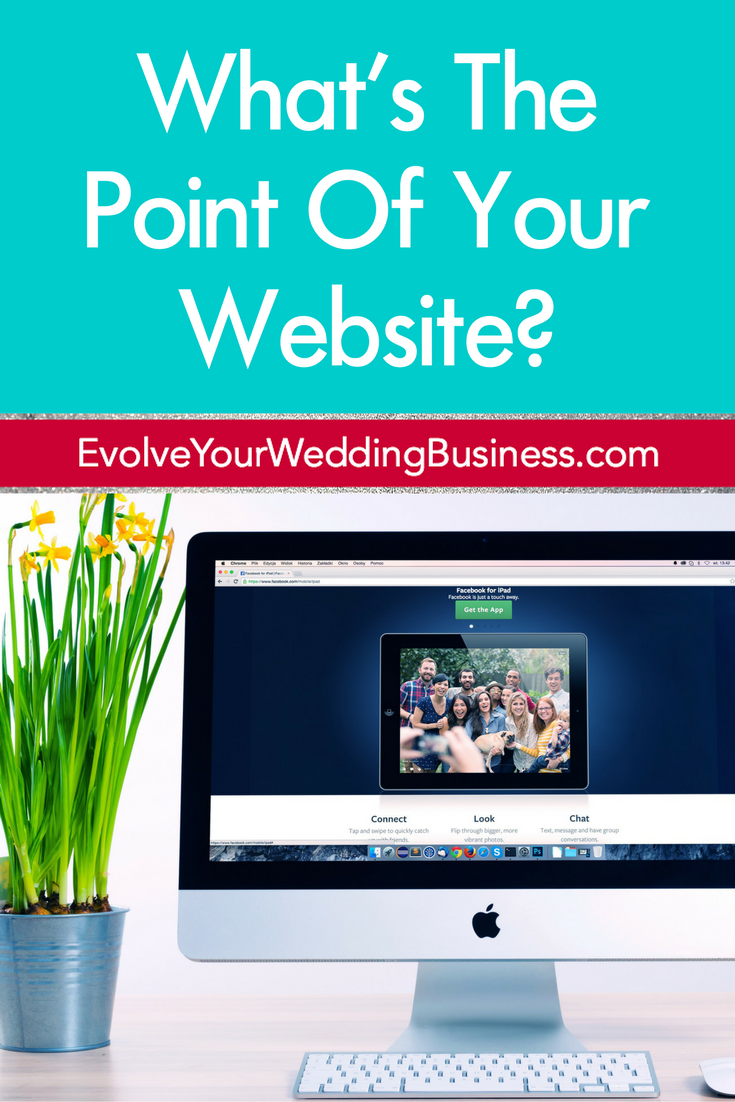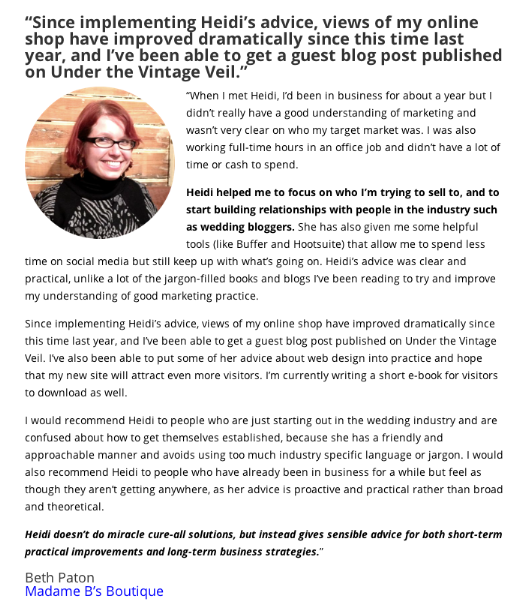Some people call me an OG of wedding business marketing, but deep down I'm just another person wearing PJ bottoms on Zoom. I swear a lot, I share my struggles, and I don't pretend to be better than anyone else.
a marketing and business nerd who fell in love with the wedding industry.
Hi, I’m Heidi
What’s The Point Of Your Website?
Why does your website exist?
What is its job?
What role does it play in your overall business strategy?
If you’re thinking “So people can find me and book me”, think again.
That may be the end result, but there have to be steps taken before they are ready to work with you and if you don’t have those in place, the sales won’t happen.
What would you do if someone came up to you and asked you to marry them?
Unless you’re really itching to marry a stranger, you’d probably be kind of freaked out, uncomfortable and would look for a way to escape the situation. You probably don’t realize it, but this is exactly what you’re doing to your potential customers when you expect them to land on your website and get in touch with you to have a sales conversation.
There is a process that we all know and understand when it comes to meeting someone, getting to know them, dating them and then getting more serious with them and it doesn’t just happen overnight.
Sales is no different. That is why you need a game plan for taking these potential clients from total strangers to totally in love with you and that plan is called a sales cycle. Your potential clients move through the sales cycle step by step, getting to know and love you and closer to being ready to work with you.
Most wedding professionals ignore this and try to propose marriage on the first date.
The problem with that is that you are proposing something that is completely out of sync with the trust you’ve earned. That’s why you don’t marry a stranger and that’s why you don’t hire a stranger.
What path are visitors expected to take when they land on your site?
Most people haven’t thought about this but it can be the difference between someone getting in contact with you or just leaving your site.
Most wedding professionals give the following options to their visitors:
About
Services
Photos/Portfolio
Blog (at least you should have a blog, here’s why)
Contact
When someone visits your website while they are researching their options, they will most likely view these pages and then leave because they aren’t ready to contact you for a sales conversation and that is the only option you’re giving them. People just don’t get married on the first date.
According to Splendid Insights,
“Even affluent millennials comparison shop. Research is a way of life for this generation, it’s not a trust issue. They research everything and read an average of 13.9 reviews before making a purchase. Getting published on blogs helps give millennials more places to look when researching. This counts towards that 13.9.”
So in a world of comparison shopping, how can you ensure that more of your website visitors actually get in touch with you?
First, stop and think about why they are visiting your site to begin with. Are they trying to figure out how this whole wedding planning things works? Then be the person to give them that advice! They will remember this when it comes time to make a purchase.
You can’t propose marriage on the first date and expect to get a “yes,” but you can propose something that is proportionate to the amount of trust that your potential client has in you.
I teach my clients to think about the first step they want people to take and I suggest making that something small like asking them to provide their email in exchange for something like a helpful ebook, checklist or video. This way, you can start to build a relationship with them via email and you’re not just pouncing on them trying to get them to commit right now.
We’re going to get into email marketing in the next post in this series but there are things you can do right now.
First, take some time today to examine your own site and figure out what you are asking people to do.
Are you trying to marry them or are you offering to take them on a first date?
The “know, like, trust” factor is incredibly important in marketing. People don’t do business with people until they feel like they know, like and trust them.
What can you offer your potential clients to help them get to know, like and trust you BEFORE you ask them to call to book you?
Here’s a tip to get your gears turning: answer their biggest questions.
If you’re a wedding planner and the most common question you get is, “When do I need to book each of my vendors?” offer a timeline or a checklist in exchange for their email! You’ll answer their question, build that crucial know, like, trust factor and be able to market to them via email. It’s a win-win-win.
That’s not all though. There are other things you can do with your website to build that know, like trust factor.
1. Talk to them about what they care about
Does your website read like this? “I studied for years, and I won this award and I shoot weddings in this particular style”? If your website contains lots of personal pronouns like us, me, we, I and our then your business has “Me, Me” Syndrome but there is hope.
Your content needs to pass the “What does that mean to me?” test. When you write, put yourself in your customer’s position and question every sentence with “What does that mean to me?”. What matters to you may not matter to them because they want to know what is in this for them. Make use of “you” and tell your audience what they will get from working with you. Speak to them, not at them.
If you don’t understand your ideal client well enough to really pinpoint what they value and care about, this free webinar is for you.
2. Build credibility
Have you had styled shoots featured on blogs or magazines? Showcase those logos proudly in an “As Seen On” box on your site! Those logos provide social proof.
Social proof is a psychological phenomenon we all experience when we see that someone is trusted by others and you begin to trust them too. It’s sort of the positive version of guilt by association.
There have been studies that demonstrate the power of social proof including one from the Washington Post that showed that positive social proof was actually more influential than saving money.
This is why every McDonald’s sign says “Billions and billions served”. Knowing that billions of people have had something is reassuring to the part of us that likes to avoid risk. If you’ve ever made a decision based on an Amazon review by a total stranger, you’ve acted because of social proof. If you’ve ever been impressed that someone has been featured on a particular blog or magazine, that’s social proof at work.
Displaying where you’ve been featured isn’t the only way to build credibility through social proof. Your testimonials play a HUGE role in this but not just any testimonial will do the trick. I see a lot of bland testimonials that say things like “She was great!” or “We’re so happy we worked with you”. That only gives you a tiny piece of the story. If you want your testimonials to help you make more sales they have to describe the experience of the customer before, during and after working with you. You have to tell their story, their full story.
Here is an example of a testimonial I have from a client that shows the before, during and after.
This gives a much different feeling to the reader than something like “Heidi was great and I loved working with her”. You can identify with the feels of the person before, during and after working with me. That is exactly the type of testimonial that will help you get more clients.
You can download my exact email templates for getting testimonials like these right here.
3. Blog
Most wedding professionals seriously underutilize their blog, or don’t have one at all. The truth is, your blog can be one of the most powerful marketing tools in your arsenal. Your blog can do SO much more for you than just serving as a sort of portfolio. Your blog can actually attract your ideal clients and help you book them.
On top of giving people a reason to come to your website more than one (no they don’t want to look at your about page again) and building massive credibility & authority as the expert you are, your blog helps you make sales by getting people on to your email list and sending them through your sales funnel.
Members of The Wedding Business Collective know how important a sales funnel is and I’ve shown them how to create their own quite simply. Once you have a sales funnel you can really ramp up that know, like, trust factor and warm people up so that they’re ready to buy from you. After all, people don’t get married on the first date.
The role of your website isn’t to propose marriage.
The role of your website is to ask for the first date.
Still Paying for The Knot or WeddingWire (Even Though They Stopped Working)?
Discover the proven roadmap wedding pros use to replace outdated platforms and finally attract inquiries that lead to bookings.
Leave a Reply Cancel reply
Based in San Diego, California / working with wedding businesses worldwide

